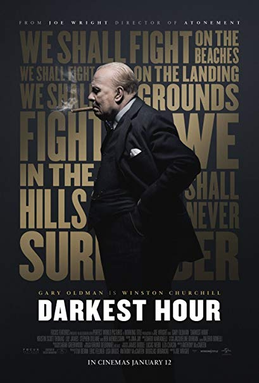2017 saw two movies released
about War-time Prime Minister Winston Churchill. Those two films, coupled with
the release of Dunkirk, focused on a similar period of history in which Winston Churchill was faced with some tough decisions that could decide the fate of the nation. Despite taking place in different periods of the war, both Churchill and Darkest Hour are remarkably similar.
The problem with two films discussing a similar subject matter being released within months of each other is that the material of the following film feels less fresh. Both Churchill and Darkest Hour present Churchill as a man who seemed to be battling against everyone in his War Cabinet whether it was to cancel Operation Overlord or whether a decision was needed to be made to surrender to the Nazi threat. It's less intresting the second time around.
The problem with two films discussing a similar subject matter being released within months of each other is that the material of the following film feels less fresh. Both Churchill and Darkest Hour present Churchill as a man who seemed to be battling against everyone in his War Cabinet whether it was to cancel Operation Overlord or whether a decision was needed to be made to surrender to the Nazi threat. It's less intresting the second time around.
Darkest Hour was always going
to be the bigger of the two Churchill films, it is the awards contender and the film
feels much more cinematic than Jonathan Teplitzky’s TV movie feel film.
Jordan’s film contains far more directional flourishes, such the tracking shot of a
dropped bomb from a German plane and panning in the dark rooms where important
decisions are made. Darkest Hour would have been a handsome film even
without these stylish touches due to the stuffy nature of the War Rooms where
the important politicians filled the room with their big personalities (but we
are left without any doubt Churchill is the biggest personality) making for a cramped, claustrophobic atmosphere.
Donned in heavy prosthetic
(Oldman spent hours in the makeup chair to become Churchill) Oldman delivers a
powerhouse performance as the British Prime Minister (such is the popularity of
his performance he has been tipped for numerous awards). Whilst not being a
spiting image of Churchill, Oldman does carry himself like Churchill, and captures his powerful oral ability.
The only critique of his performance is that a performance of such nature can
always been seen as so and so acting as so and so rather than actually watching
the character. So in this case we see Oldman acting as Churchill battling
against his own demons and the other politicians who are more than ready to
stab in in the back. It's a performance always going to get awards attention, whether or not it deserves it.
Popular Culture depictions of
Churchill has always been of interest to historians. Many depictions of
Churchill has always been the legendary version of him where is sharp wit,
quick temper and brilliant oral ability made him a highly celebrated figure
among the British public. The film tries to capture this by having Churchill
take a ride on the Underground in what is the most toe-curlingly embarrassing
scene in the entirety of 2017. It’s such a clumsy way to get across the point
that Churchill, and his speeches, galvanised the nation.
The film’s biggest problem is the
way the film treats the war. More left leaning people have criticised many films of
being flag wavey and overly patriotic (drawing links to Brexit). This criticism was
(wrongly) aimed at Dunkirk, but it is slightly more relevant here. The film
seems to celebrate Churchill’s stubborn determination against his fellow
cabinet members and completely forgoes the suffering that normal people felt
during the war. As a result the film’s far too sanitised and light for something that was
supposedly the countries’ darkest hour.
2.5/5
2.5/5




Love your last paragraph here, it was something I never picked up on myself but you're absolutely right!
ReplyDelete